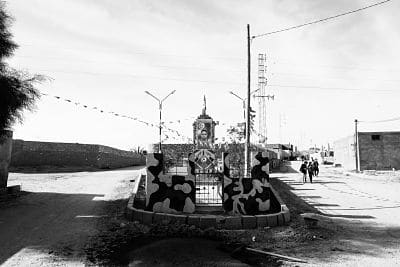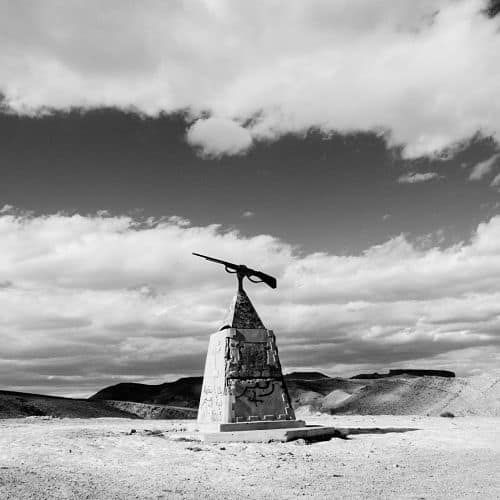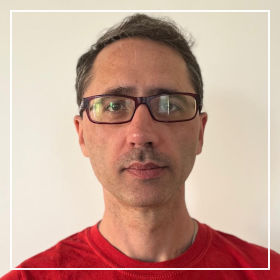This morning I felt that I couldn’t bear this passivity any longer. I was sinking in my red plastic chair without anything to do. In those moments, when I think I have to wait until the evening for someone or something, I am captured by anguish and fear. Sometimes I ask myself, if I live my entire life here, what could I tell to my babies? If I were lucky, I could talk about my escape to Europe; if I am not, I would have nothing to say (field notes, Redeyef, November 20, 2014).
I went to Tunisia for my PhD field research in January 2014, and two months later I moved to Redeyef, a small mining town in the southwestern Governorate of Gafsa, near the Algerian border. Local economy is based on the extraction and transportation of phosphates to the coastal towns of Sfax and Gabes. In 2008, an uprising broke out and lasted six months.

Some analysts claimed it was the first organised social movement Tunisia had since the mid-1980s (see for example Gobe 2011). The revolt occurred when cases of corruption in the hiring system at the local Gafsa Phosphate Company was discovered. Today, the Gafsa social movement is widely recognized as a precursor of the demonstrations (in January 2011) that pushed president Zine El Abidine Ben Ali to leave the country.
Recalling the local past, I was fascinated by the inhabitants’ memories of these riots. The Gafsa mining basin has a long history of protests, syndicalist actions and armed resistance against the power of French Protectorate.
I wanted to investigate how local histories and memories could influence the interpretations of the Tunisian revolution. This included the role played by ‘interior’ regions, and how this reconfigured past could give birth to new forms of activism and militancy.
When I started living there, it seemed to me that the most important social activity was sitting in the cafés.
Thus, I decided to do the same and began speaking with the clients, all of whom were men. It is at this point that I found boredom. At first, I knew it as a mood I myself experienced; as my research proceeded, it began clear that boredom was the local expression of marginality and exclusion.
A PLACE OF EXCLUSION
Founded in the early years of the 20th century under French colonial rule, Redeyef is located in Tunisia’s ‘shadow zone’. A dramatic regional imbalance between north-eastern and south-western regions was due to the heritage of the colonial economy implanted in the country during the Protectorate. Since independence in 1956, several governmental development plans continued to reproduce this imbalance, favouring the capital Tunis and the coastal regions of Sousse, Monastir, Sfax, and Bizerte.
Touristic enterprises, economic and financial activities, and light industries concentrated mostly in Tunis and the so-called Sahel, the coastal areas in the east. Consequently, in time, thousands of poor Tunisian families left their towns and moved to the capital and coast. According to the World Bank, approximately 56% of the population and 92% of all industrial firms in the country are located within an hour’s drive from Tunis, Sfax, and Sousse. These three coastal cities are the centers of economic activity, accounting for 85% of the entire country’s GDP (World Bank 2014: 282).
Characterized by the incumbent presence of the phosphate extraction industry, the Gafsa mining basin went through a profound crisis in the mid-1980s. A Structural Adjustment Plan, financed by the IMF and World Bank, requested the corporate restructuring of the Gafsa Phosphate Company, the closure of the ancient mines, and firing of 75% of the employees.

At the same time, the government did not invest in the region, excluding it from public investments and development plans. Consequently, unemployment in the region skyrocketed. After the revolution, a stable occupation remains a dream. In 2012, the unemployment rate in the Governorate was 26.7% and the national score was 17.6% (Bedoui 2013: 54).
Ben Ali’s authoritarian regime and cultural policy exacerbated this structural inequality, resulting in the closure of every place of cultural consumption and leisure in the city (cinema, theatre, the local salle des fêtes, etc.). Nowadays, if you do not work, you have limited activities to participate in the city.
DEFINING BOREDOM IN REDEYEF
I was sitting at a café near the main boulevard, staring at the vehicles passing and people slowly walking by. Ayoub, a thirty-year-old man working for the Phosphate Company, was sitting next to me. After some minutes, he said smiling: “Nice town, uh? Calm, quiet… nothing happens here”.
Ayoub has a good job and from time to time he can save some money that he uses to build his own house. He works six days per week in a rotation system: morning, afternoon, or night. He is the first who talks about boredom with me. Speaking French as I cannot speak Tunisian Arabic properly, he describes his daily life as routine. He expresses how he is bored of repetition, of never-changing days: work, café, home. However, to “break the routine” he can visit his relatives in Algeria, go to the desert at Tozeur, or move to the Sahel with its sunny beaches. Ayoub is lucky, as unemployed or underemployed men do not have his chance.
In many parts of the country, job opportunities are occasional, patronal networks manage the few public funds dedicated to regional development, and private investments are absent.

Thus, citizens lie in a suspended state perceived as a ‘social death’, waiting for employment. In uncertain times, such as those Tunisia is currently going through, “waithood” is becoming the feature of a specific form of governmentality that manages the lives of people excluded by a formal market (Meddeb 2015).
I interpret the social suffering caused by this situation through the category of “existential boredom”.
Philosopher Lars Svendsen (2005) has proposed a typology of boredom. The first type, which he calls situative, contains a longing for something desired, and is expressed by bodily markers such as yawning and wriggling in the chair. The second, called existential boredom, “contains a longing for any desire at all” (Svendsen 2005: 42).
Existential boredom is a question of meaning: it arises when our daily activities are perceived as deprived of any meaning about life. Thus, if our time markers cannot bear any significance, then we feel our time is empty and standing still (Barbalet 1999: 637). This is precisely what, in my analysis, the terms routine and boredom stand for.
According to Ghassan Hage, the sense of a good life is rooted in what he calls ‘existential mobility’, that is the experience of life as ‘going somewhere’. When people do not feel is occurring, they can feel their time as interrupted and/or stuck (Hage 2009). This is the case of Mohamed, a man in his fifties I met in a café near the local Labour Union offices.
He had returned to Redeyef after spending twenty years in Italy, where he worked doing several jobs. Two years ago, he won a place in a private enterprise funded by the Phosphate Company and went back to Tunisia, but cases of corruption in the recruitment system impeded him from beginning work. He used to pass his days at the café. He shared that he was forced to ask his mother for money to buy a coffee and a packet of cigarettes and felt ashamed at his age.
“All days are the same, I go here in the morning, have a coffee, I smoke, and then I go home for lunch. Then I sleep. In the afternoon, I have a coffee. I wake up in the morning, and my day is the same as tomorrow and yesterday. This ain’t life”.

I passed near a house during a walk with a friend one night. We saw four men sitting on a bench, and my friend recognized a relative amongst them. We stopped to talk with him.
This man lived in France and was there to collect documents necessary for the renewal of his visa. While asking me what I thought about the town he started:
“You see the city? Ain’t nothing here. Can you imagine what it means to grow up here? From Gafsa southward, it is the edge of life, you know what I mean?”. “We are excluded from life, and we have no choice” said the man sitting next to him.
This emptiness of time is sometimes expressed in terms of an absence of life. The time of doing nothing is equal to death.
WAITHOOD, AGENCY, AND SUBJECTIVITY
The structural inequality affecting the region does not give many possibilities to change one’s situation. Yet, narrative is itself a form of agency, since it permits a reflective stance toward reality. Furthermore, time and temporality are not just an oppressive force pushing people into passivity: they can become a resource creatively utilized by actors in order to make their life bearable, and to construct an imaginary horizon for the future. Thus, life flows between a daily routine made of waiting, emptiness, and an effort to build an alternative to present.
I met Aymen, a man in his thirties, in October 2014. Unemployed for two years, he spent a great amount of time at the café: “My days are a copy-and-paste, and my future is exactly predictable. I wake up and go to the café. The days are always the same, until I die”. Between 2004 and 2013, he lived in Monastir in the east, working in the tourist sector for a very low salary (approximately ninety Euros per month), and decided to return home. He attempted to find a job in the local companies opened by the State after 2008 riots, but corruption and clienteles frustrated his efforts.
He had a problematic and ambiguous relation with his past, which he described as a hard period when, however, he could work. Life in Monastir had ‘been tough’, switching between an emphasis on the harshness of his experience, and a nostalgia for the past: “Life was hard” he said one day at a café. “Sometimes I could not pay the hostel and slept in public gardens, but every day I said hamdoulellah, thanks God. I had a job there”.
During this research, he helped to conduct interviews with young men who did not speak French. Sometimes, Aymen made me wonder if he was influenced by what he heard. One day, we interviewed two elderly men who participated in the 2008 social movement. They had found a job due to a Government decree. Their comments reminded Aymen of a past when he had a job. “I regret of not being here in 2008, not for the riots, but because those who were imprisoned, they found an occupation”.

Aymen’s relation with the future was ambiguous, too. It was an imaginary horizon filled with two different desires: making the past the future (i.e., returning to Monastir), or leaving the country, which was impossible without money.
A few weeks later he was introduced to a French woman in her forties who was seeking a partner; although he was not in love with her, he started a long-distance relationship through Skype conversations. She offered him to pay one hundred Euros per month not to travel to the coast, and he accepted. When we met six months later, he was no longer concerned about his unemployment: all his energy was directed at managing the relationship in order to marry her and leave Tunisia. “I have no choice here, he said, I want to leave this place, and she’s my chance. If she will bring me to France, I’ll be a faithful husband for my entire life!”.
Waiting (for a job, a marriage, or a chance to leave the country) is a condition lived by a growing number of youths in Tunisia.
People like Aymen express the suffering they feel in a manner that can be better understood through the category of existential boredom. The structural lack of prospects makes time still and repetitive until something new or unexpected occurs and raises the hope that the future will be different from the present.
TIME AND MARGINALITY
Boredom is often associated with modernity. It arises from the very processes of Western modern age: industrialization, consumption, and secularization (Anderson 2004, Goodstein 2005, Spacks 1996, Svendsen 2005, Toohey 2011).
However, time, as Martin Demant Frederiksen (2013) says, can also be a fundamental dimension of marginality. People set aside the goal of ‘a good life’ (job, social services, leisure) can experience time as a form of oppression; waithood and the structural inequality of conditions in post-revolutionary Tunisia can lead people to express their suffering in a form similar to what Western thinkers call existential boredom.
Yet, this marginality is not based on the simple expulsion from a meaningful temporality: different pasts, presents and futures overlap and vary according to the situation, and guide peoples’ lives and choices. This makes waithood a complex experience that requires both patience and creativity.
Forced in inactivity, including in a bodily sense, people cope with exclusion in a “subjunctive” mood (Whyte 2002) by making it a narrative, by adjusting to changing situations, or by imagining different temporalities. Subjunctive is the mood of hope, doubt, desire, and possibility. In taking decisions about their lives, people like Aymen wait and cope with uncertainty as the sole means to achieve a better and meaningful life.

ACKNOWLEDGMENTS
This paper is based on data collected between January 2014 and June 2015, included in a chapter of my dissertation thesis. The views expressed here are mine. Thanks to Martin Demant Frederiksen, Paolo Grassi and Giuseppe Scandurra for reading and commenting on earlier versions of this essay.
REFERENCES
Anderson B. 2004, Time-Stilled Space-Slowed: how Boredom Matters, Geoforum, Vol. 35, pp. 739-754.
Barbalet J.M. 1999, Boredom and Social Meaning, The British Journal of Sociology, Vol. 50, No. 4, pp. 631-646.
Bedoui A. 2013, Le défi de l’emploi et la nécessité de repenser le modèle de développement, Forum tunisien pour les droits économiques et sociaux, Tunis.
Frederiksen M.D. 2013, Young Men, Time, and Boredom in the Republic of Georgia, Temple University Press, Philadelphia PA.
Goodstein E.S. 2005, Experience without Qualities: Boredom and Modernity, Stanford University Press, Redwood CA.
Gobe E. 2011, The Gafsa Mining Basin between riots and a Social Movement: Meaning and Significance of a Protest Movement in Ben Ali’s Tunisia, HAL-SHS.
Goodstein E. 2005, Experience Without Qualities: Boredom and Modernity, Redwood: Stanford University Press.
Hage G. 2009, Waiting Out of the Crisis: On Stuckedness and Governmentality, in G. Hage (ed.), Waiting, Melbourne University Press, Carlton Victoria.
Meddeb H. 2015, L’attente comme mode de gouvernement en Tunisie, in I. Bono, B. Hibou, H. Meddeb, M. Tozy, L’État d’injustice au Maghreb, Karthala, Paris.
Spacks P.M. 1995, Boredom: The Literary History of a State of Mind, University of Chicago Press, Chicago IL.
Svendsen L. 2005, A Philosophy of Boredom, Reaktion Books, London UK.
Toohey P. 2011, Boredom. A Lively History, Yale University Press, New Haven and London.
Whyte S.R. 2002, Subjectivity and Subjunctivity. Hoping for Health in Eastern Uganda, in R. Werbner (ed.), Postcolonial Subjectivities in Africa, Zed Books, London UK.
World Bank 2014, The Unfinished Revolution. Bringing Opportunity, Good Jobs and Greater Wealth to all Tunisians, Development policy review.





